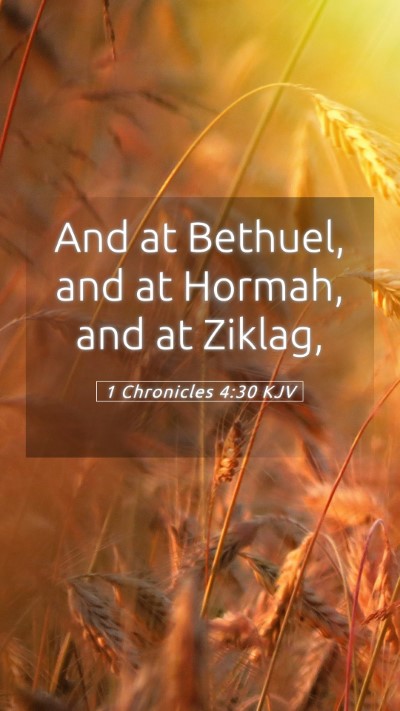Bible Verse Meaning of 1 Chronicles 4:30
Verse: 1 Chronicles 4:30 states, "And at Bethuel, and at Hazar-susah, and at Hazar-gaddah, and at Hebron, and at Zior, and at En-gedi." This verse is part of a genealogical record emphasizing the family lineage of the tribe of Judah.
Overview of the Verse
This passage offers details on the territorial holdings of certain clans within the tribe of Judah. These geographical designations are significant as they help define the settlement patterns and heritage of the Israelite tribes.
Bible Verse Explanations
According to Matthew Henry, this verse not only records specific locations but indicates the importance of these towns in the context of Judah's vast inheritance. Each location holds historical significance, relating to the settlement of the tribes and their various inheritances delineated in other parts of the Book of Chronicles.
Albert Barnes notes that the specific mention of places like Hebron and En-gedi reflects the legacy of these regions tied to Judah, one of Israel's most significant tribes. It showcases the territorial boundaries and provides a link to the dwelling places prominent in the narrative of Israel's history.
Adam Clarke emphasizes the genealogical aspect and how it reflects the faithfulness of God in fulfilling His promises about the land for Israel. He points to the continuous lineage as proof of God's commitment to Israel and the assurance of their inheritance.
Understanding Scripture: Historical Context
The historical context of this verse is crucial for proper interpretation. It appears during a section in 1 Chronicles that lists genealogies to affirm the legitimacy of the tribes and their allocations in the Holy Land. These records served to reassure the returning exiles of God's fulfillment of His covenant with them.
Key Interpretations
- Genealogy and Inheritance: The verse illustrates the genealogical records that affirm the tribal structure of Israel and God's covenant of land.
- Historical Significance: Locations mentioned had notable roles in the unfolding story of Israel's journey and settlement.
- Affirmation of God’s Promises: The continuity of lineage underscores God's faithfulness in fulfilling His promises to His people.
Bible Study Insights
For those engaging in Bible study groups or online Bible study, analyzing this verse can enhance understanding of Judah's role and relevance in the larger narrative of the Bible. Utilizing Bible study tools such as maps and timelines can enrich discussions around these locations and their significance.
Cross-References
- Joshua 15:62: Provides a broader context about the cities of Judah.
- 1 Samuel 30:1: Mentions the significance of Hebron in David’s story.
- Disscourse on Land Inheritance: Deuteronomy 34 explores the distribution of land and its importance.
Applying Bible Verses to Daily Life
Understanding the significance of 1 Chronicles 4:30 encourages readers to reflect on God's faithfulness in their lives. Just as He ensured the inheritance of land for Israel, believers today can trust in God's promises for their journeys.
Conclusion
This passage may appear purely genealogical, but with an in-depth Bible verse analysis, the spiritual implications and connected history become evident. Each name and location serves as a reminder of God’s faithfulness and the historical context of Israel's identity.


